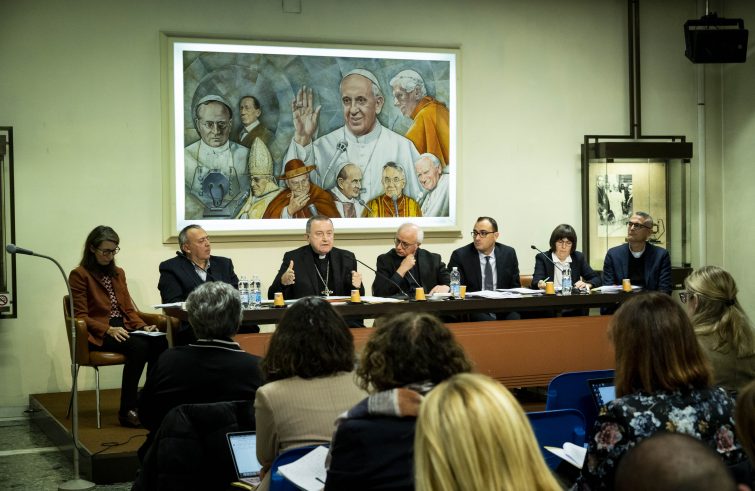
A total of 89 incidents of abuse were reported in the years 2020-2021, including for crimes committed in the past. These are the findings of the first National Report on the Protection of Minors in Italian Dioceses, presented today in Rome by the Italian Bishops’ Conference. “The Dicastery for the Doctrine of the Faith received a total of 613 abuse files from the dioceses in the last twenty years”, said Monsignor Giuseppe Baturi, archbishop of Cagliari, general secretary of the Italian Bishops’ Conference, replying to a question from journalists. “The Italian Church will conduct an investigation on the basis of these findings, the first of its kind in the world,” Baturi announced, referring to documentation regarding complaints of alleged abuse lodged with the former Holy Office.
Reported cases. The Report presented today, due to be published on a yearly basis, includes the profile of the 68 alleged perpetrators: more than half of them were 40 to 60 years old at the time of the offences, 30 of them were priests, followed by lay people (23) and finally by members of the clergy (15). The most common positions held by the lay offenders include teacher of religion; sacristan; oratory or summer camp animator; catechist; association director. The context in which the alleged offences were committed was for the most part a specific location (94.4%), a parish (33.3%) or in the premises of a movement or association (21.4%) or in a formation house or seminary (11.9%).
Counselling services. Most dioceses set up a Counselling Service (70.8%), especially in the larger dioceses (84.8%). The Report provides data on 90 Counselling and Listening centres: 21 of these were created in 2019 or earlier, 30 in 2020, 29 in 2021 and 10 in 2022. The activity of the Counselling Services is strictly linked to the size of the diocese, with 38 of them located in large dioceses or dioceses that have merged. The seat of the Counselling Service is located outside the diocesan Curia 74.4% of the time. More than two thirds of the Services are managed by lay persons (77.8%). The choice of a priest is less frequent (15.5%), so is that of a member of the clergy or a nun (6.7%). Among the laity, there is a clear majority of women, who thus account for two thirds of the persons in charge. In most cases (83.3%), the counselling services were backed by a team of experts. In the two-year period under review, a total of 86 people contacted all 30 counselling centres, 38 in 2020 and 48 in 2021. In terms of gender, the majority of persons who contacted the Service were women (54.7%).
Services for the Protection of Minors. All 226 Italian dioceses have set up a diocesan service for the protection of minors (SDTM – Servizio Diocesano Tutela Minori). In fact, the Report collected 158 answers from 166 dioceses involved: 8 of these Services are of an inter-diocesan nature. The statistical representativeness of the sample is 73.4%. Dioceses in this sample are mostly medium-sized (with a population of 100 to 250,000), followed by large dioceses (over 250,000) and small dioceses (up to 100,000). In most cases, the person in charge is a priest (51.3%), followed by a layman or laywoman (42.4%) and very seldom a member of a religious order or a nun (6.3%). In contrast, in smaller dioceses the person in charge is, in more than half of the cases, a lay person (56%), and in the remaining ones a priest. 77.2% of the dioceses surveyed have a team of experts to support the Service, whose primary activities consist of meetings and formation courses.
Formation. The number of formation meetings offered in the two-year period under review (2020-2021) registered a marked increase – from 272 meetings in 2020 to 428 in 2021. This trend is growing: from 7,706 in 2020 to 12,211 in 2021, with the greatest increase among pastoral workers, up from 3,268 to 5,760. With regard to prevention and the fight against paedophilia, the National Council of Catholic Schools has just published the Guidelines for the Protection of Minors in Catholic Schools. Furthermore, pointed out Msgr. Baturi, “the Italian Bishops’ Conference has been invited to become a permanent member of the Observatory for the Fight against Paedophilia and Child Pornography, with a dedicated memorandum of understanding signed on 28 October last by the Italian Bishops’ Conference and the Holy See, represented by Cardinal Zuppi and Cardinal O’ Malley respectively.
“It’s time to wash the dirty laundry in public. It is our duty as Church, but this awareness must be raised in all sectors of civil society. We must learn to speak out and denounce, we must not shrug it off.”
It is the appeal of Msgr. Lorenzo Ghizzoni, head of the Italian Bishops’ Conference’s National Service for the Protection of Minors and Vulnerable Persons. Responding to questions from journalists, Bishop Ghizzoni pointed out that “93% of all incidents of abuse take place in the family or within the circle of trust created in settings frequented by minors.” Over the past few years, the expert noted, the perception of the severity of abuse has changed for the better: “There is a different awareness of abuse survivors. The true change, as Church, occurred when we started to put ourselves in the victims’ shoes.” According to Bishop Ghizzoni, “the same occurred on a societal and cultural level: after all, paedophilia became a criminal offence incorporated into Italian law in the late 1990s. We see a special awareness of the problem of abuse – but it’s still not enough. We are abandoning the idea that dirty laundry must be washed in public.”











